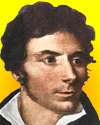 (source)
(source)
|
Lorenz Oken
(1 Aug 1779 - 11 Aug 1851)
German naturalist who offered early evolutionary ideas in comparative anatomy, wrote books on natural history for students and adults, founded a scholarly journal, and organized scientific congresses.
|
Science Quotes by Lorenz Oken (5 quotes)
Der ganze Mensch ist nur ein Wirbelbein.
The whole of a human being is merely a vertebra.
The whole of a human being is merely a vertebra.
— Lorenz Oken
Quoted in Henry Harris, The Birth of the Cell (1999), 62.
During its development the animal passes through all stages of the animal kingdom. The foetus is a representation of all animal classes in time.
— Lorenz Oken
In Lorenz Oken, trans. by Alfred Tulk, Elements of Physiophilosophy (1847), 491.
Man is the summit, the crown of nature's development, and must comprehend everything that has preceded him, even as the fruit includes within itself all the earlier developed parts of the plant. In a word, Man must represent the whole world in miniature.
— Lorenz Oken
In Lorenz Oken, trans. by Alfred Tulk, Elements of Physiophilosophy (1847), 2.
Physio-philosophy has to show how, and in accordance indeed with what laws, the Material took its origin; and, therefore, how something derived its existence from nothing. It has to portray the first periods of the world's development from nothing; how the elements and heavenly bodies originated; in what method by self-evolution into higher and manifold forms, they separated into minerals, became finally organic, and in Man attained self-consciousness.
— Lorenz Oken
In Lorenz Oken, trans. by Alfred Tulk, Elements of Physiophilosophy (1847), 1.
The cells are thus the stomachs of which the plant has millions like mouths.
— Lorenz Oken
In Lorenz Oken, trans. by Alfred Tulk, Elements of Physiophilosophy (1847), 264.
See also:
- 1 Aug - short biography, births, deaths and events on date of Oken's birth.
- Large color picture of Lorenz Oken - head and shoulders (500 x 650 px)



 In science it often happens that scientists say, 'You know that's a really good argument; my position is mistaken,' and then they would actually change their minds and you never hear that old view from them again. They really do it. It doesn't happen as often as it should, because scientists are human and change is sometimes painful. But it happens every day. I cannot recall the last time something like that happened in politics or religion.
(1987) --
In science it often happens that scientists say, 'You know that's a really good argument; my position is mistaken,' and then they would actually change their minds and you never hear that old view from them again. They really do it. It doesn't happen as often as it should, because scientists are human and change is sometimes painful. But it happens every day. I cannot recall the last time something like that happened in politics or religion.
(1987) -- 


